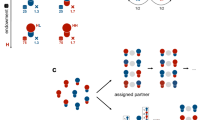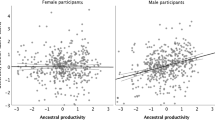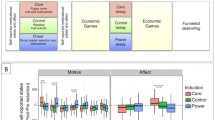Abstract
Despite the importance of human cooperation, the psychological mechanisms by which humans choose their cooperative partners and divide the spoils of cooperation are still unclear. To address these questions, we first contextualize human cooperation within biological market theory and then present results from a series of economic games in which we test how a cooperative partner’s generosity and productivity affect their desirability as a partner and intuitions about how entitled they are to keep the spoils of cooperation. We found that the evaluation of productivity and generosity cannot be fully explained by the incentive structure of the game, but appeared calibrated for choosing long-term cooperative partners and dividing cooperatively created resources within a biological market. Specifically, productivity mattered more to men than to women, and productivity mattered more when it revealed underlying skill rather than luck. In addition, generosity had far larger effects than productivity, but the effect of productivity was moderated by generosity, suggesting sophisticated heuristics for choosing cooperative partners. We discuss implications of our data for the study of social perception and suggest avenues for future research.






Similar content being viewed by others
Notes
A reviewer expressed concern over the use of deception on Amazon Mechanical Turk, suggesting that it may foster suspicion in the participant pool. Though evidence on the effects of experimental deception is mixed, we acknowledge this concern and welcome the development of evidence-based rules governing the use of deception or incomplete information in online studies.
We thank an anonymous reviewer for this suggestion.
References
Aktipis, C. A. (2004). Know when to walk away: contingent movement and the evolution of cooperation. Journal of Theoretical Biology, 231(2), 249–260.
Apicella, C. L. (2014). Upper-body strength predicts hunting reputation and reproductive success in Hadza hunter–gatherers. Evolution and Human Behavior, 35(6), 508–518.
Barclay, P. (2013). Strategies for cooperation in biological markets, especially for humans. Evolution and Human Behavior, 34(3), 164–175.
Barclay, P. (2016). Biological markets and the effects of partner choice on cooperation and friendship. Current Opinion in Psychology, 7, 33–38.
Barclay, P., & Willer, R. (2007). Partner choice creates competitive altruism in humans. Proceedings of the Royal Society of London B: Biological Sciences, 274(1610), 749–753.
Barrett, L., & Henzi, S. P. (2006). Monkeys, markets and minds: biological markets and primate sociality. In P. M. Kappeler & C. P. van Schaik (Eds.), Cooperation in primates and humans: mechanisms and evolution (pp. 209–232). Berlin: Springer.
Baumard, N., André, J. B., & Sperber, D. (2013). A mutualistic approach to morality: the evolution of fairness by partner choice. Behavioral and Brain Sciences, 36(01), 59–78.
Benenson, J. F., Kuhn, M. N., Ryan, P. J., Ferranti, A. J., Blondin, R., Shea, M., et al. (2014). Human males appear more prepared than females to resolve conflicts with same-sex peers. Human Nature, 25(2), 251–268.
Bshary, R., & Noë, R. (2003). The ubiquitous influence of partner choice on the dynamics of cleaner fish–client reef fish interactions. In P. Hammerstein (Ed.), Genetic and cultural evolution of cooperation (pp. 167–184). Cambridge: MIT Press.
Cherry, T. L., Frykblom, P., & Shogren, J. F. (2002). Hardnose the dictator. The American Economic Review, 92(4), 1218–1221.
Cosmides, L., & Tooby, J. (1992). Cognitive adaptations for social exchange. In J. Barkow, L. Cosmides, & J. Tooby (Eds.), The adapted mind: evolutionary psychology and the generation of culture. New York: Oxford University Press.
Delton, A. W., & Robertson, T. E. (2012). The social cognition of social foraging: partner selection by underlying valuation. Evolution and Human Behavior, 33(6), 715–725.
Delton, A. W., Krasnow, M. M., Cosmides, L., & Tooby, J. (2011). Evolution of direct reciprocity under uncertainty can explain human generosity in one-shot encounters. Proceedings of the National Academy of Sciences, 108(32), 13335–13340.
Eisenbruch, A. B., Grillot, R. L., Maestripieri, D., & Roney, J. R. (2016). Evidence of partner choice heuristics in a one-shot bargaining game. Evolution and Human Behavior, 37, 429–439.
Fiske, S. T., Cuddy, A. J., & Glick, P. (2007). Universal dimensions of social cognition: warmth and competence. Trends in Cognitive Sciences, 11(2), 77–83.
Fleiß, J. (2015). Merit norms in the ultimatum game: an experimental study of the effect of merit on individual behavior and aggregate outcomes. Central European Journal of Operations Research, 23(2), 389–406.
Gurven, M., Allen-Arave, W., Hill, K., & Hurtado, M. (2000). “It’s a wonderful life”: signaling generosity among the Ache of Paraguay. Evolution and Human Behavior, 21(4), 263–282.
Hall, J. A. (2011). Sex differences in friendship expectations: a meta-analysis. Journal of Social and Personal Relationships, 28(6), 723–747.
Jaeggi, A. V., Hooper, P. L., Beheim, B. A., Kaplan, H., & Gurven, M. (2016). Reciprocal exchange patterned by market forces helps explain cooperation in a small-scale society. Current Biology, 26(16), 2180–2187.
Kaplan, H., Hill, K., Cadeliña, R. V., Hayden, B., Hyndman, D. C., Preston, R. J., et al. (1985). Food sharing among ache foragers: tests of explanatory hypotheses. Current Anthropology, 26(2), 223–246.
Lewis, D. M., Conroy-Beam, D., Al-Shawaf, L., Raja, A., DeKay, T., & Buss, D. M. (2011). Friends with benefits: the evolved psychology of same- and opposite-sex friendship. Evolutionary Psychology, 9(4), 543–563.
Macfarlan, S. J., & Lyle, H. F. (2015). Multiple reputation domains and cooperative behaviour in two Latin American communities. Philosophical Transactions of the Royal Society of London B: Biological Sciences, 370(1683), 20150009.
Marlowe, F. W. (2007). Hunting and gathering the human sexual division of foraging labor. Cross-Cultural Research, 41(2), 170–195.
Marlowe, F. (2010). The Hadza: hunter-gatherers of Tanzania. Berkeley: University of California Press.
McNamara, J. M., & Leimar, O. (2010). Variation and the response to variation as a basis for successful cooperation. Philosophical Transactions of the Royal Society of London B: Biological Sciences, 365(1553), 2627–2633.
Melis, A. P., Hare, B., & Tomasello, M. (2006). Chimpanzees recruit the best collaborators. Science, 311(5765), 1297–1300.
Noë, R., & Hammerstein, P. (1994). Biological markets: supply and demand determine the effect of partner choice in cooperation, mutualism and mating. Behavioral Ecology and Sociobiology, 35(1), 1–11.
Noë, R., & Hammerstein, P. (1995). Biological markets. Trends in Ecology & Evolution, 10(8), 336–339.
Raihani, N. J., & Barclay, P. (2016). Exploring the trade-off between quality and fairness in human partner choice. Royal Society Open Science, 3(11), 160510.
Roberts, G. (1998). Competitive altruism: from reciprocity to the handicap principle. Proceedings of the Royal Society of London B: Biological Sciences, 265(1394), 427–431.
von Rueden, C., Gurven, M., & Kaplan, H. (2008). The multiple dimensions of male social status in an Amazonian society. Evolution and Human Behavior, 29(6), 402–415.
Sugiyama, L. S. (2004). Illness, injury, and disability among Shiwiar forager-horticulturalists: implications of health-risk buffering for the evolution of human life history. American Journal of Physical Anthropology, 123(4), 371–389.
Tooby, J., & Cosmides, L. (1996). Friendship and the banker’s paradox: other pathways to the evolution of adaptations for altruism. Proceedings of the British Academy, 88, 119–144.
Tooby, J., & Cosmides, L. (2008). The evolutionary psychology of the emotions and their relationship to internal regulatory variables. In M. Lewis, J. M. Haviland-Jones, & L. F. Barrett (Eds.), Handbook of emotions (3rd ed., pp. 114–137). New York: Guilford.
Trivers, R. L. (1971). The evolution of reciprocal altruism. Quarterly Review of Biology, 46, 35–57.
Vail, A. L., Manica, A., & Bshary, R. (2014). Fish choose appropriately when and with whom to collaborate. Current Biology, 24(17), R791–R793.
Vigil, J. M. (2007). Asymmetries in the friendship preferences and social styles of men and women. Human Nature, 18(2), 143–161.
Wojciszke, B. (2005). Morality and competence in person- and self-perception. European Review of Social Psychology, 16(1), 155–188.
Wrangham, R. W. (1999). Evolution of coalitionary killing. American Journal of Physical Anthropology, 110(29), 1–30.
Acknowledgements
We are grateful to John Tooby and Leda Cosmides for providing funding for this project and to the members of the Center for Evolutionary Psychology at UCSB for their valuable feedback and suggestions.
Author information
Authors and Affiliations
Corresponding author
Ethics declarations
Conflict of Interest
The authors declare that they have no conflict of interest.
Electronic Supplementary Material
ESM 1
(DOCX 392 kb)
Rights and permissions
About this article
Cite this article
Eisenbruch, A.B., Roney, J.R. The Skillful and the Stingy: Partner Choice Decisions and Fairness Intuitions Suggest Human Adaptation for a Biological Market of Cooperators. Evolutionary Psychological Science 3, 364–378 (2017). https://doi.org/10.1007/s40806-017-0107-7
Published:
Issue Date:
DOI: https://doi.org/10.1007/s40806-017-0107-7




